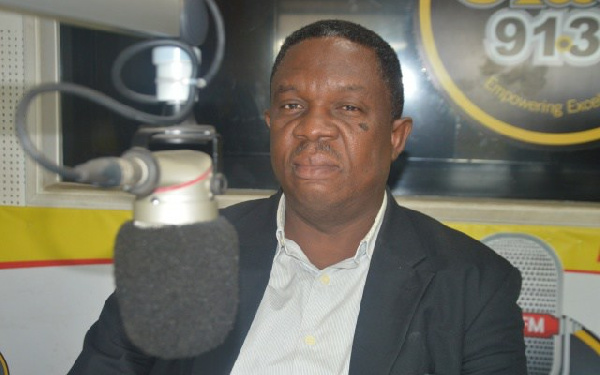GPCC wants clergy to take responsibility for COVID-19 church infections
The Ghana Pentecostal and Charismatic Council (GPCC) says church leaders have to take responsibility for any coronavirus infection traced to church services as the ban on public gathering is eased.
President of GPCC, Rev. Dr. Paul Frimpong-Manso, said “leadership should always go with responsibility.”
“We have to take responsibility if there is empirical evidence to prove that the person took on the sickness in our church,” the General Superintendent of the Assemblies of God Church stated in an interview on Joy FM, monitored by theghanareport.com.
Churches are trying to work out how to comply with a slew of protocols for religious services introduced by the government to help check the spread of coronavirus.
For the first time in more than three months, religious services can now resume.
But services are not to go beyond one hour and with not more than 100 people, all masked throughout the service.
At least two churches have come out to say, they would remain closed until public and social life is normalised.
Several others, however, are set to re-open amid concerns religious groups may flout the coronavirus containment protocols.
But the GPCC President, Dr. Frimpong-Manso is confident church leaders obey and enforce the protocols. If a person gets an infection traced to a church, the leaders, he said, must be willing to accept responsibility.

In contrast, the General Secretary of the Christian Council of Ghana (CCG), Reverend Dr Cyril Fayose says, “I don’t think we (churches) have any legal responsibility.”
Rev Fayose, a senior clergy the Evangelical Presbyterian (E.P.) Church holds the view that “the church is a voluntary organisation, so you come to church on your own volition. No one forces you to come to church” hence “there is no legal responsibility”.
However, he indicated that the council is putting measures in place to support member churches that cannot afford facilities to help curbing the spread of infections.
He explained that it would be challenging to establish that an infection was even contracted during worship, but they will “put in all the necessary precautions so that people are not infected in the church”.
Ghana’s total cases as of Tuesday, June 2, was 8,070 with 2,947 recoveries and 36 deaths.
The guidelines for churches presented by the Religious Affairs Minister, Kofi Dzamesi, after the President’s announcement are as follows:
I. Thermometer guns or thermal scanners are provided for checking the temperature of congregants at entry points of all venues as necessary.
II. Ensure a No mask: No entry Policy
III. Provision of handwashing facilities with running water and soap and/or FDA approved alcohol-based hand sanitiser.
IV. Provision of adequate waste management facilities (bins, cans, bin-liners and single-use tissues).
V. Provision of adequate toilet facilities for use by members.
VI. Regular cleaning and disinfection of frequently used communal places (like toilet surfaces) and frequently touched surfaces such as doorknobs/handles, preferably every 1-2 hours depending on the rate of utilization.
VII. Designate a holding room or area where a person who becomes sick at the premises/event can be isolated from others while making arrangements for evacuation.
VIII. Regular disinfection of venues used by churches, preferably once every month. For example, fumigation and disinfection must be carried out with recognized entities like Zoomlion.
IX. Trained cleaners with the necessary personal protective equipment and cleaning items to clean the facilities regularly and handle waste appropriately.
X. Provide adequate ventilation, i.e. open windows to allow for maximum circulation of fresh air, if possible, avoid confined air-conditioned rooms.
XI. Display approved health promotion materials on COVID-19 at vantage points to remind congregants to keep to social distancing protocols, wearing of the masks, regular handwashing, coughing, and sneezing etiquette.
XII. Ensure a No handshake, No hugging and No Spitting policy at all time.
XIII. Follow established evacuation procedures (as outlined in Annex 1) to enable evacuation if a congregant becomes sick during the event and has to be evacuated.
XIV. Form COVID task force comprising of members who are preferably health workers. They must be trained in Health Promotive prevention measures, Infection Prevention and Control (IPC) and Evacuation Procedures by Ghana Health Service.
XV. The COVID task force should Call 112 or 311 for support to enable evacuation if anyone develops fever, cough, and difficulty in breathing during service.
XVI. Unwell Persons are not allowed to attend church
XVII. Older persons and people of any age with underlying medical conditions, heart diseases, diabetes, liver disease, and asthma are advised to stay away from church service
XVIII. Sharing personal items such as watches, jewelry, pens and phones should be discouraged.
XIX. If an individual is confirmed positive for COVID-19, all contacts must be traced and screened.
XX. No crowd dancing and waving of handkerchiefs during church services.
XXI. Sanitize microphones immediately after each use.
XXII. All who speak/sing in churches (including Pastors, Sunday school teachers, Singers and Announcers) must wear facemask during service.
XXIII. Discourage singing in groups. Pre-recorded songs or solos should be used.
XXIV. Pre-packaged communion bread and wine should be picked up by members at the point of entry.
XXV. Place offering bowls at the entrance and exit points for members to give offerings and tithes when entering or on their way out of church premises. Encourage cash transfers via mobile money or mobile banking as forms of giving offerings.
XXVI. In observance of social distancing protocols, laying on of hands should not be allowed.
XXVII. Spend at least 5 minutes of church service time to educate church members on Covid-19.
XXVIII. Provide separate sitting areas for the aged and for families that are together.
XXIX. The church is encouraged to mobilize resources to help individuals in need including offering church health facilities.


